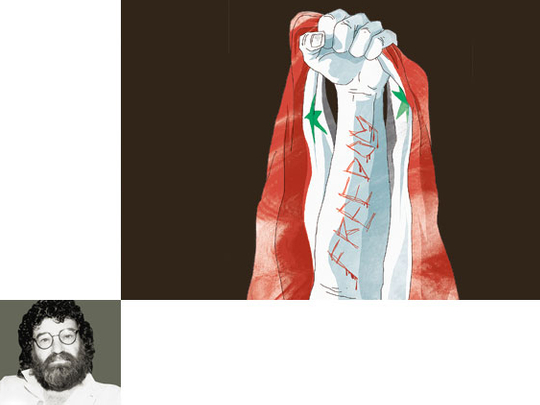
While Rome burned during the Great Fire of AD 64, Emperor Nero is said to have sat back and fiddled. It's unclear whether the story, invoked in our time as a proverbial reflection on an individual or an institution that neglects priorities in moments of dire crisis, is apocryphal. We do know, however, that the story of the Arab League pussyfooting it while Syria burned is not.
Though the ancient land of Bilad Al Sham is not literally on fire, its besieged civilians have been getting killed, incarcerated, tortured and disappeared by the thousands, while members of the Arab League met at an opulent hotel last Monday to affirm their commitment to the group of monitors the organisation had dispatched to Syria on December 27. The group's mission? To observe the implementation of an agreement that called on the government in Damascus to halt military operations in urban centres, end violence against peaceful demonstrators and free the countless political prisoners arrested since the uprising began 10 months ago.
The group, led by General Mohammad Al Dabi, a man of dubious qualifications as an observer of human rights violations, has shown that it lacks the moxy, the competence and the independence required to play the role that it was tasked with as a fact-finding mission. While visiting the devastated city of Homs, for example, where hundreds have been killed, including children, General Al Dabi asserted, in what surely should be ranked as the most comical observation of the month, that the city, true, looked somewhat ragged but "there was nothing frightening there". Well over 400 civilians have been slaughtered by Syrian troops and security forces since the observers arrived in the country. Now if that doesn't frighten the General, along with his cohorts, then he clearly has a different conception of the value of human life than that which the rest of us hold.
To be sure, the ‘Arab Parliament', the helpless adjunct of a toothless institution, recently called for the observers to be recalled since they have proved to be incompetent and biased, not to mention that they indirectly were giving cover to the Al Assad regime to continue its efforts to cow the Syrian population into submission through resort to ever harsher tactics. And make no mistake about it, this Baathist regime, given its blood record over the last four decades, will kill and stab to insure its survival. No questions asked, no explanations given.
Is it possible that a great many political leaders in the Arab world, as an Amnesty International report issued last Monday suggested, do not seem to grasp the full significance, the profound gravity, of what is happening in Syria? While Nero fiddled as Rome burned, in like manner Arab leaders today confine themselves to issuing releases from an opulent hotel in Cairo while innocent civilians and whole towns are pummelled. Is it possible, more tellingly, that this kind of prevarication, perhaps even crass indifference at the suffering of ordinary citizens by their ruling elite, that has triggered the mass rage behind the Arab Spring, a movement that seeks, at root and branch, the radical re-orientation of social consciousness in the Arab world and of the idiom around which Arabs organise their communal sense of reference?
If the Arab League does not have the know-how, the resources and the imagination to put a stop to the 10 months of bloodshed in Syria, then it should turn the issue over to a body that does. It could — it should — seek a Security Council resolution under Chapter 7 of the UN Charter, a jurisdiction that mandates the use of an international armed force to guard besieged civilians under assault by rogue governments and other predatory forces. And if Russia and China veto the resolution, then they will go on record, and in the history books, for having chosen to pursue a mercenary stance instead of a moral one.
Meanwhile, in a rambling speech in Damascus on Tuesday, President Bashar Al Assad claimed that the mass uprising in his country was caused by a "foreign conspiracy". His government, he said, will not relent. And indigenous "armed gangs" will be confronted by the regime's iron fist. "We will not be lenient with those who work with outsiders against the country", he said. (Those putative "outsiders" were not named.)
If the Syrian autocrat is telling us anything here he is telling us this: Not unlike other dictators in the Arab world who had evinced a paranoid streak before being given the boot by their people, Al Assad seems to have lost his grip on reality and he is telling us further that he intends to continue mercilessly butchering Syrian citizens until he can butcher no more.
It now appears that the Arab League, given its background as a mere debating club, will not solve — or will not alone be able to solve — this conflict, a conflict that may progressively hurtle into a tragic civil war. The road ahead, not just for Syrians but for other young Arabs engaged in the Arab Awakening, remains beset with potentialities of crisis, suffering and reversal. And it appears, equally clearly, that the regime, which has already killed close to 6,000 Syrians, will try to kill yet another 6,000, and yet another, all in order to protect the Al Assad family's dynastic rule — and it will do it without any compunction, unless it is stopped in its tracks by a credible force with muscle, not just a gentle slap on the wrist by the Arab League.
Fawaz Turki is a journalist, lecturer and author based in Washington. He is the author of The Disinherited: Journal of a Palestinian Exile.










